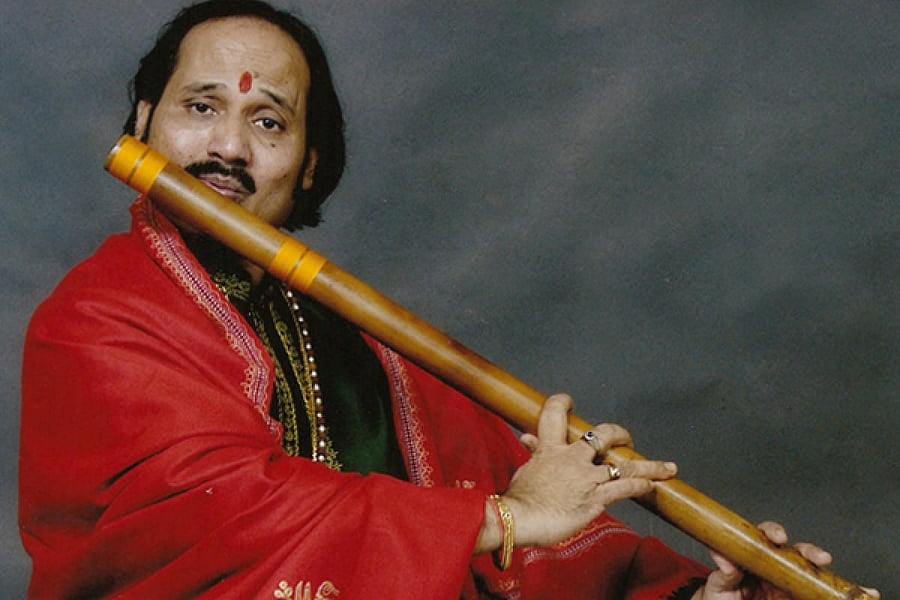
The flute for me is my life — my association with Lord Krishna. Just looking at it takes me back to the ghats of Varanasi where I spent the first 10 years of my life,” says renowned flautist Pt Ronu Majumdar who counts himself lucky to have been exposed to the culturally rich environs of the city that nurtured some of the giants of the world of dance and music, including Pt Kishan Maharaj, Girija Devi and Ustad Bismillah Khan.
As part of the recent Legends of India concert where he performed non-stop for close to three hours, Majumdar says, “It was one of the most enjoyable baithaks playing in front of connoisseurs of music.” The evening saw him give renditions of a varied range, including Raag Gorakh Kalyan, Rajasthani Maand, Banarasi Kajri, and even ‘Bada natkhat hai’ from Bollywood as his tribute to Lord Krishna. “The audience wouldn’t let me wind up, such was the maahol created,” smiles the Sangeet Natak Akademi-awardee who started playing the flute from the age of six, under the tutelage of his father Dr Bhanu Majumdar, “who may have been a amateur flautist but was serious enough to be a shishya of the bansuri legend Pt Pannalal Ghosh,” he lets on.
‘Music chose me’
When Majumdar Sr, a homeopathic doctor and “a great patron of the arts,” saw his little son play around with his flute “his gut told him that Ronu needs to be taught music. So, that’s how I was initiated into it,” says Majumdar, the only one among his seven siblings to do so. “The others were all into academics. But, while I chose music or should I say music chose me, I also had to complete my graduation. My father was particular about that,” he remembers.
But in no way was music allowed to suffer. “My father was so strict that I was not permitted to eat anything until I had done my morning abhyaas (practice) properly. And Baba had the full support of my mother in all this – she, too, was as strict,” he laughs.
Soon after his family shifted to Mumbai, Majumdar became the disciple of the legendary Pt Vijay Raghav Rao and also started learning vocal music from Pt Lakshman Prasad Jaipurwale. “Vocal training is a must for any Indian classical musician, especially in the initial stages,” feels Majumdar and goes on to reminisce about the time in Varanasi when every Tuesday, his father would take him for the Hanuman Chalisa rendition by thumri samrat Pt Mahadev Prasad Mishra. “Even though I was very young, his style and rendition had such an impact on me that it subconsciously made its way into my own gayaki as well,” he smiles.
Big league
And then, when he was still in his teens, destiny brought him in touch with the renowned sitar player Pt Ravi Shankar. Soon, he became a part of the recording of the musical giant’s ‘Atha swagatam, shubh swatagtam’ created for Asiad ‘82. And over the years, ‘Computer’ – the nickname Ravi Shankar gave Majumdar because of his swiftness in writing music notations -- was inducted into Ravi Shankar’s orchestra and travelled across the world with him, “Panditji also insisted I learn the intricacies of the Maihar gharana to set my flute-playing apart from the others. In that respect, I would call him my ‘path-pradarshak’,” he adds.
It was around the same time that Bollywood reached out to him -- when RD Burman was looking for a flautist, “Someone whohad heard one of my recitals on AIR, arranged a meeting with Panchamda,” remembers Majumdar. What made him pass muster in RD’s estimation was his rendition of Raag Khamaj that the music composer asked him to play. It was only a matter of time then that the youngster became an integral part of almost all RD compositions – from ‘Yaad aa rahi hai’ to ‘Kuch naa kaho, kuch bhi naa kaho’. Talking about his music for RD’s last film 1942: A Love Story, Majumdar says, “After we finished recording, Panchamda told me that my flute piece would become as famous as the song… and that’s what happened. My only regret is that he didn’t live to see the rage the song went on to become.”
Being a part of RD’s orchestra also brought him in touch with veteran violinist from Goa Sir Stanley Gomes. “He was a legend, and I can say that I learnt the intricacies of Western Classical music from him.” These lessons stood him in good stead when he worked with Bela Fleck on Tabula Rasa that got a nomination at the Grammy’s and with Ry Cooder on Fascinoma.